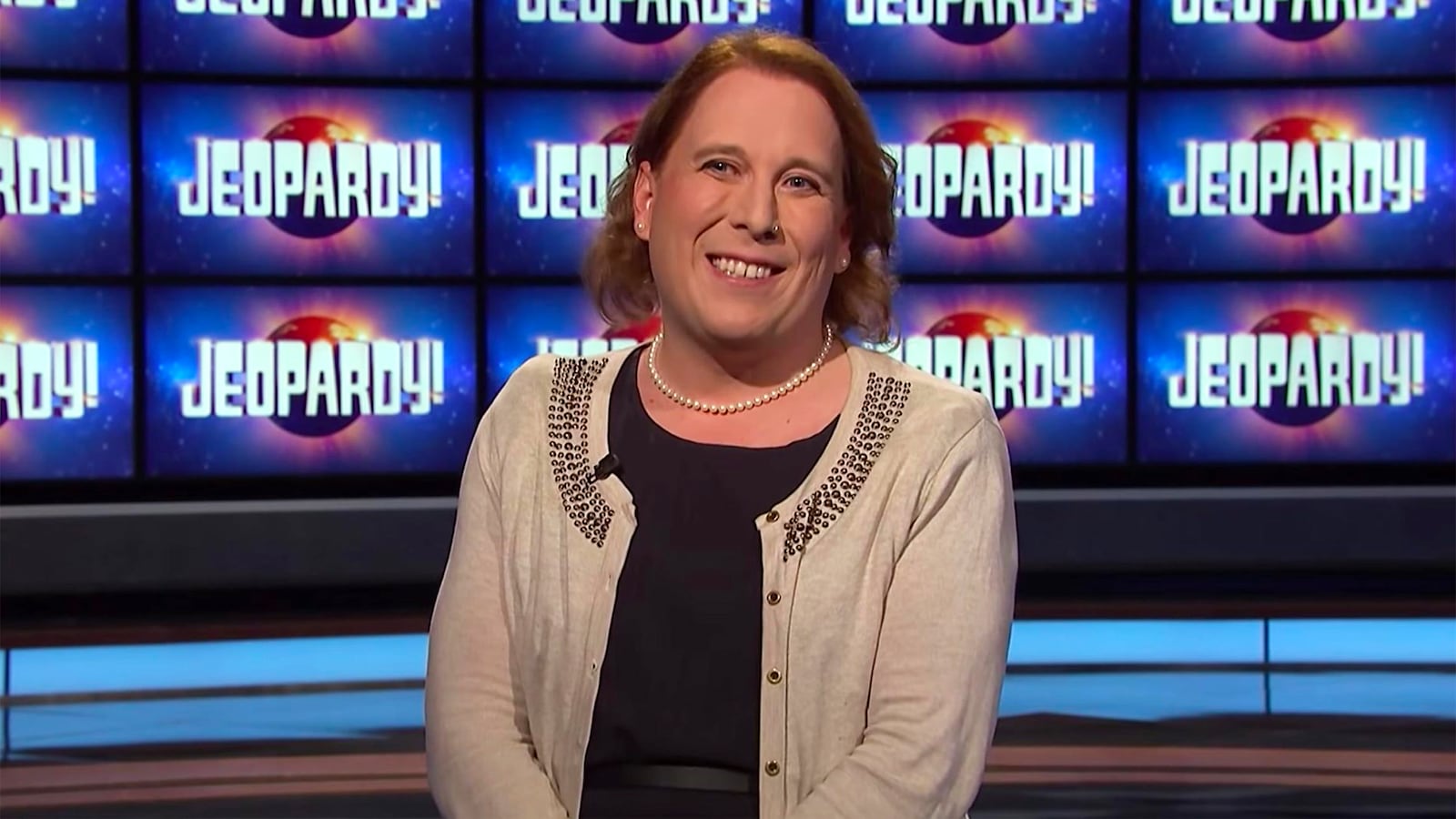After a two-week break, reigning Jeopardy! champion Amy Schneider returns to American TV screens Monday having won 13 consecutive games, earning a whopping $536,400 and securing her place in the trivia game show’s history as the fourth-biggest winner in regular season-play, so far.
Schneider even outpaced the average winnings of Ken Jennings, the former champion and now co-host of Jeopardy! by $7,000. He won 74 games in a row in 2004, a record that still stands.
The software engineer is also the most successful out-transgender contestant in Jeopardy! history, her winning streak beginning during Trans Awareness Week.
“Being trans is an important, huge foundational part of my identity and also, not,” Schneider told The Daily Beast from her home in Oakland, Calif. “I’m not going on Jeopardy! to be trans on Jeopardy! I’m going on Jeopardy! to try to win some money.”
Schneider, 42, said competing on Jeopardy! is the culmination of a decades-long dream which had its origins in 1984, watching legendary host Alex Trebek launch a revival of the challenging quiz show with her family, when she was still in kindergarten.
“I can’t remember not watching it,” said Schneider. “Alex Trebek started hosting when I was like 5 or 6, and we must have been watching since the beginning of that.” She tweeted that this was something she’d “dreamed of her whole life.” (Schneider has been quick to share anecdotes about her responses on the show with her 19.5K followers on Twitter, as well as details about her private life.)
Schneider is also the first out transgender contestant to win an invitation to the coveted “Jeopardy! Tournament of Champions,” in which the top players of each season compete. Last month, Schneider confirmed to her followers on Twitter that the reason she appeared on the Nov. 26 episode wearing a pin bearing the blue, white, and pink colors of the transgender pride flag designed by Monica Helms, was because she herself is trans.
“I am a trans woman, and I’m proud of that fact,” she tweeted, “but I’m a lot of other things, too!”
Schneider also said she thought being trans is “really cool,” and told The Daily Beast she was grateful to the producers for being cool about her identity.
“I really want to praise everybody on Jeopardy!” she said. “Until I brought it up, they never mentioned or referred to me being trans. And had I not brought it up, it was clear that they wouldn’t. And it would never have been commented on if I didn’t want it to be. I really appreciated that about them. I never had one even mildly uncomfortable moment around that with anyone on the Jeopardy! staff, and that was really, really great.”
So why out herself at all?
“One of the motivations was, I don’t want people wondering, and I don’t want people getting weird about it,” explained Schneider. “I also didn’t want to give the impression that it was a secret, and that it was something I wanted to conceal or that I was ashamed of, in any way, or anything like that. So, I didn’t want to be, you know, ‘the trans person,’ but I also didn’t want pretend like that wasn’t true or it didn’t matter.”
Schneider made it a point to note she’s not the first out trans contestant; Fran Fried of Connecticut competed in 2017, and one year ago this week, Michigan native Kate Freeman of Los Angeles won the Final Jeopardy round to become the first openly trans winner. There’s also a former champ from the 1990s who reportedly transitioned after a series of victories.
“Those were very important to me, the trans contestants that have been on before,” Schneider said. “It suddenly felt a lot more uncomfortable to be on TV after I came out, but seeing them there made me feel like it’s perfectly fine. It’s funny: the producer said at some point, ‘I don’t even know how many trans contestants have been on Jeopardy! and I was like, ‘I know.’”
“It doesn’t really feel like bravery to me”
Schneider is often called “brave” for coming out, something cisgender people often say to trans people after they transition. While conceding there is some bravery and courage involved in transitioning, she rejects those labels.
“It doesn’t really feel like bravery to me,” she said, “because there wasn’t a choice; the alternative wasn’t possible. So, given that, it doesn’t feel that ‘brave’ to just do what I felt I had no choice but to do.”
She came out four and a half years ago following the death of her father, a catalyst that’s not uncommon, at least not for this writer and others in the community. But she tweeted that there’s more to the story than that. “When I say I realized I was trans in 2016, I’m simplifying a process that in some ways had been going on my whole life, and certainly since 2011 or so, but 2016 was when I finally realized that I was living a lie, and began to let my true self show.”
And on June 30, 2017, she started living her authentic life.
“The first thing that got me thinking about [transitioning] was being in Midsummer Night’s Dream as a character that had to play a woman in the play,” Schneider recalled. (It was for a community theater in San Jose, Shady Shakespeare, later renamed Silicon Valley Shakespeare.) “Putting on a dress every night started to really force me to ponder some things. But the moment that I really knew what it was, I was just sitting around my apartment one day, and I suddenly had this thought: ‘If I were to die that day, I would be buried in a suit and tie.’ And that felt so upsetting to me. At that moment, I said, ‘OK, this is what I am. This isn’t whatever else I’ve been trying to pretend that it is. It’s not bad.’”
Too often, interviews of trans people conducted by cis journalists focus on what they lose, what they must sacrifice to transition and the impact of that transition on those around them, instead of focusing on their own joy. Schneider found that joy in silencing a metaphorical alarm bell.
“The first step of it was just the absence of pain,” said Schneider. “The analogy I always use is that it was like there was an alarm going off in the back of my brain, my whole life, and I never knew how to turn it off. And then suddenly I could. The sheer relief of having that suddenly go quiet was just an amazing, amazing experience that I’ll never get over.
“I think beyond that it is good to be seen and to be myself, to be able to have whatever personality I have and to show it—I’m not even trying to be more outgoing and all these sorts of things, I just am—because there’s no longer something I’m hiding from everyone. I’ve been able to form such deeper relationships, with my girlfriend and in friendships. And that’s just been incredibly, incredibly wonderful.”
During the two-week break from fresh episodes, she’s tweeted about meeting her ex-wife in college, their divorce, her sleeve tattoo which the show requires her to cover-up, how she met her girlfriend Genevieve and a photo of their pet, Meep, a black cat they adopted from the Oakland SPCA.
“We’ve been together about a year. It was sort of a long period of essentially being a couple while claiming to be just friends,” Schneider said. “In March, we completed our family when we adopted Meep.”
Although she’s missed an answer or two (she tweeted that she realized after ringing in, she’s not a fan of actor Dennis Quaid), so far she hasn’t been stumped, at least not in any episodes that have aired. “I’m not sure that there’s been one yet,” Schneider said. “There’s definitely a couple of examples I can think of, but they haven’t aired yet.”
“I like the way the taping works,” she said. But recording Jeopardy! can also be taxing, with as many as five episodes back to back. “Five is a grind,” she said. “Just maintaining that focus takes so much more energy than you realize, so every commercial break, I was leaning on the podium and trying to give my feet a rest and space out for a few minutes, until I had to lock back in again.”
“A real, real blessing in my upbringing”
In our interview, Schneider expounded about another tweet, about growing up in Ohio, where classmates voted her “most likely to appear on Jeopardy! and how her upbringing by educators amid marginalized neighbors formed her worldview.
She grew up in Dayton, in a pretty conservative Catholic environment, “which certainly had an impact, beyond the sort of general ignorance of sexuality that comes with that,” Schneider told The Daily Beast. “It was the ’80s and trans just was not a concept that anybody knew about; there wasn’t even anybody denouncing it, because nobody had heard of it. Balancing against that, I had parents that loved learning and loved knowledge for its own sake. They both worked at the University of Dayton, and that was really, really valuable. And they also were very committed to social justice as well, and made sure that I grew up in a diverse neighborhood, of which there are very few.
“Dayton is a highly segregated city, and that was something that was really important to them. It definitely was really valuable to me that I could see all the people that my classmates were afraid of; I lived with them. They’re all on my block and it’s fine; they’re not scary. So that I think, was a real, real blessing in my upbringing.”
Schneider said she recognizes that her historic run on Jeopardy! could have an impact on its audience and hopefully in Hollywood, but hasn’t let that get to her head. “It’s not nothing,” said Schneider, noting Jeopardy!’s “certain aura,” wide reach and respect it inspires. Its older audience may be less likely to see trans people in the media they consume, she added.
“At the same time, it’s also just a game show, so, I don’t know, in the broader scheme of society, how much of an impact that is. It’s a big deal to get on Jeopardy! But hundreds of people do every year, so, it’s not that crazy a thing. I do think this is the representation that is needed: trans people just doing stuff, not coming out, not suffering, just doing stuff. That is something that I would love to see more of.”
Her own winning streak is something that also helps repair the show’s damaged image, she said. “For one thing, I hope that this can get the bad taste of Jeopardy!’s last year out of everyone’s mouth and get them more into what Jeopardy! has always been about.”
Like all Jeopardy! fans, Schneider cringed at the controversies that she said “tarnished” the show’s reputation in the year since Trebek died, starting with revelations of alleged sexual harassment and discrimination levied at executive producer and host Mike Richards, who was ultimately fired.
“I’m glad that they pushed me back a year and I didn’t have to be directly involved with any of it,” she said. “I’m glad that the old guy is gone and there’s no point in my talking too much about it, because it’s all kind of done at this point. But, I think that it’s disappointing to see such an institution be a little bit tarnished. It was not fun to witness. But I do feel like it’s getting back on its feet. I think Ken’s been a great host.”
Although she said she had been hoping LeVar Burton would get the hosting gig, Schneider called the job of succeeding Trebek “a specialized skill” and enjoys how Jennings preps the contestants, even though he’s limited in what advice he can lend as a former champion himself.
“He gives us all the same general tips at the beginning of every show, which is, ‘Relax, have fun and have a good time. The hard part is over; you’re here. You get to be on the show. It’s really cool, and it’s over really fast. So enjoy it.’”
Schneider said she puts that advice into practice while time flies by.
“It feels like two minutes and then the episode’s over! It is really crazy that way,” she said. “I had to do a lot of preparation to be able to be relatively relaxed on that stage, because this is something I've been trying to do for over a decade.
“I really had to be OK with the idea that I would try for a decade to get on beyond one show, and not win. And that would be it. I really had to work on accepting that that was OK because otherwise, I would have been paralyzed by the fear of that happening. That’s definitely something I would very much recommend to anyone that’s going to be on the show: lower the stakes in your own mind. It’s really, really crucial.”
“Just by doing this thing I wanted to do, I’m getting a little activism out of it”
Schneider told The Daily Beast she doesn’t consider herself a transgender activist but does feel perhaps she should be. “That’s been one of the nice things about this, I've gotten to feel like, just by doing this thing I wanted to do anyway, I’m getting a little activism out of it.”
She’s done so by tweeting that voters in Ohio should reject Republican candidates: “No matter who the Republican candidate is, one of their goals in office will be to make life harder for me personally. Don’t give them the chance!”
Schneider also weighed in on the legislative efforts in more than 20 states to restrict trans youth from access to gender-affirming care, which is significantly related to lower rates of depression, suicidal ideation and suicide attempts among trans and nonbinary youth, according to a study published in the Journal of Adolescent Health on Tuesday.
“The thing that is vital to understand and that is genuinely difficult to understand if you’re a cis person, is that this is lifesaving medical care,” Schneider said. “Children will die as a result of laws like this. I would die if I was forced off of hormones and not able to live as myself anymore. If I were to see any chance of that ending, I’m not sure I would be able to keep living. It doesn’t sound like it's as vital to the lives of trans people as it is, and it can be easy to think of as just kind of like an aesthetic thing or an elective thing. But it's just not. I worry. It’s a tough feeling knowing that there’s so many people in this country for whom some dead trans people is a price they're willing to pay.”
Schneider said she’s been surprised at the ratio of positive to negative reactions to her winning streak, having been on Twitter a long time; she called it a “very pleasant surprise.”
“One of the things that’s really been meaningful is, I have heard from other trans people, but I’ve actually heard a lot more from parents and grandparents of trans people,” she said. “And so I think I have given them some relief from their fear for their loved one, that their trans child or grandchild is going to be limited in life and isn't going to be able to succeed because of this. By showing myself succeeding in such a grandparent-friendly way, I think that has made them feel a little better. So that’s been really nice.”
But then there’s the other side of Twitter, filled with TERFs, trolls and bots.
“The negative side has been what it is, you know: ‘You’re a guy in a dress’ and all that sort of thing. One that amused me was like, ‘Oh, just another gay guy that wants us to call them ‘she.’ And I was like, ‘I talk about my girlfriend repeatedly, you’re completely off base there, buddy!’”
Schneider said top brass at the show’s parent company, Sony, put her in touch with GLAAD’s Nick Adams, the director of transgender representation for the media advocacy organization, to provide guidance in dealing with those kinds of engagements. That advice is: don’t engage.
“I’ve been doing my very best not to engage and just block and ignore it. Once, however, somebody had just posted this long thing about how ‘Thinking you’re a woman is just a psychological delusion, not an identity.’ And I said, ‘Counterpoint. No, it’s not.’ And then blocked him because that was the one time I’ve given in to that temptation.”
What Schneider is most proud of, however, isn’t snarky tweets or even her own personal success, but the message the show is sending to closeted fans.
“There are trans people out there, watching me, who are smart trivia nerds,” said Schneider, who hopes she can “lessen their fear a little bit, and give them a bit more hope about what might be possible for them.”







